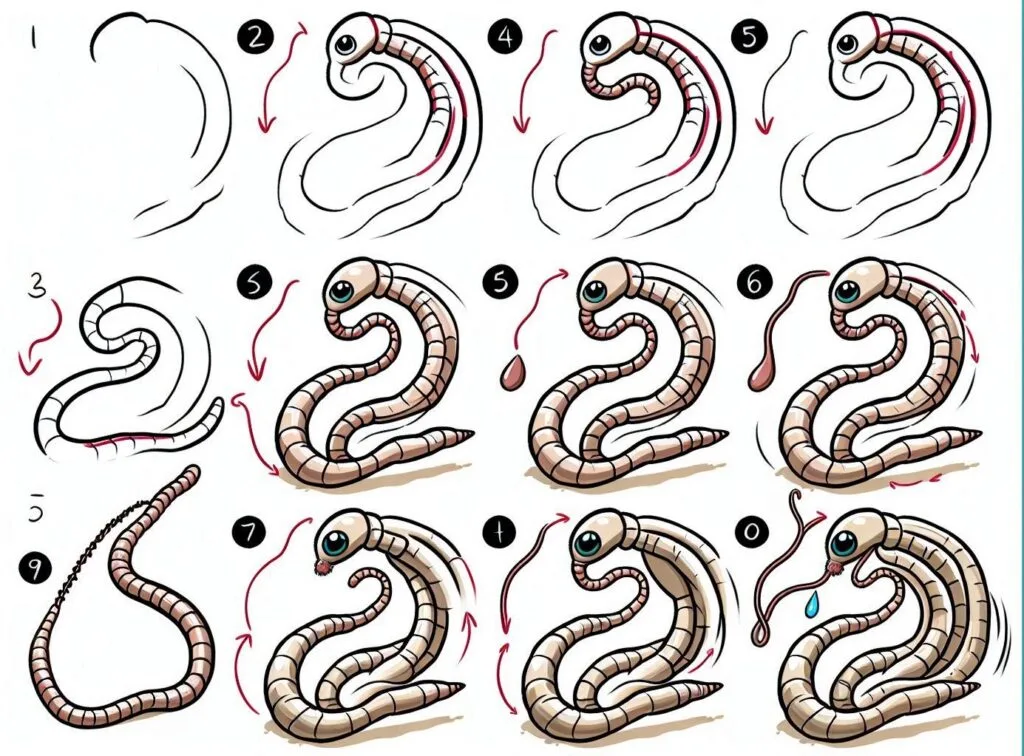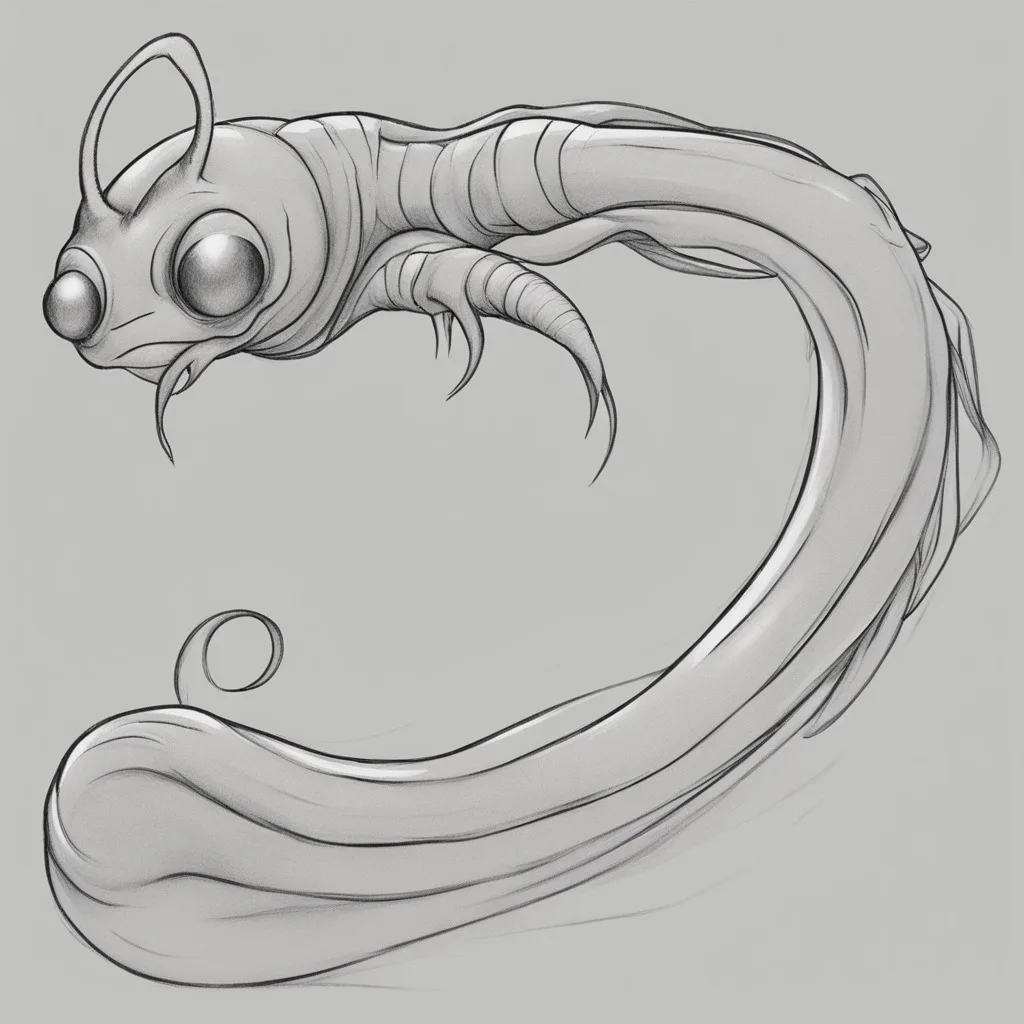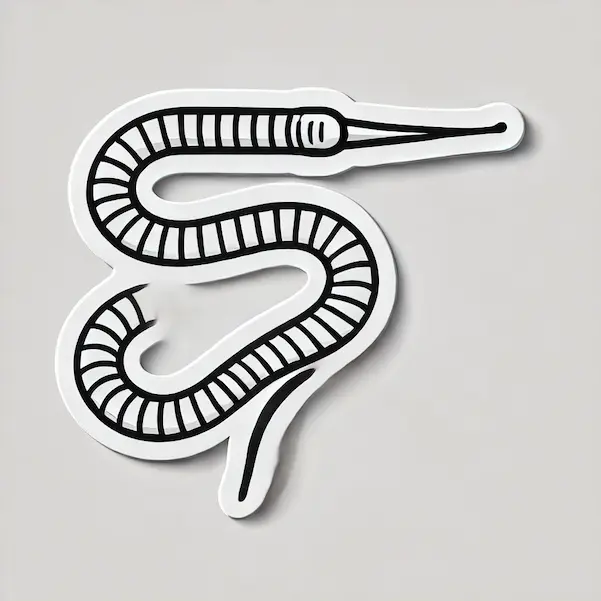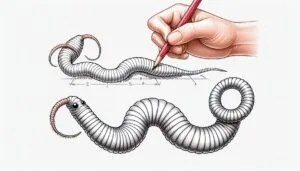How to draw whipworm illustration can be a thrilling journey for young artists! Whipworms are intriguing parasites that inhabit the intestines of both humans and animals. With this easy-to-follow tutorial, we’ll walk you through the process of creating a whipworm drawing from scratch!
Table of Contents
Materials Used
- Before we get started, make sure you have all the necessary materials ready.
- Pencils available in different lead grades: HB, 2B, and 4B.
- Precise writing instruments or markers with a narrow tip
- Colored pencils, markers, or watercolors can be used for artistic creations.
- Sketchbook or drawing paper
- Images of whipworms for reference
- Eraser

Step-by-Step Guide : How to draw Whipworm
Step 1: Research and Reference Images:
- Begin by searching for images of whipworms online or in biology books.
- Take a moment to appreciate their different shape and characteristics.
Step 2: Basic Outline:
- Start with a lengthy, curved line to depict the whipworm’s body.
- Incorporate a slightly thicker section at one end to represent the head.
Step 3: Tail and Segments:
- Continue the curved line to form the tail. The tail should be slimmer than the head.
- Whipworms display a segmented appearance. Include multiple small, evenly spaced lines along the body to depict these segments.
Step 4: Mouth and Details:
- Point out the area around the mouth, which is located near the head. Opening can be made simple.
- Incorporate some unique bumps or ridges along the body to create an interesting texture.
Step 5: Coloring
- choose for soft, pastel hues for the body. Whipworms commonly have a pale or translucent appearance.
- You can incorporate a hint of brown or grey to depict the internal organs.
Step 6: Shading and Highlights
- Use shading techniques to add depth to the drawing. Include shadows along the segments.
- Keep certain areas of the drawing lighter to show highlights.
Step 7: Fine Tuning
- Remove any unnecessary instructions and polish the specifics.
- Make sure to double-check your proportions and make any necessary adjustments.

FAQs (Frequently Asked Questions)
What Is a Whipworm?
Whipworms are parasitic worms that reside in the large intestine. Their shape is whip-like, which is why they are called that.
Are whipworms harmful?
When present in large quantities, whipworms can lead to health problems. Fortunately, there are effective treatments available.
How do whipworms reproduce?
Whipworms lay eggs that are expelled from the body through faeces. These eggs have an impressive ability to endure in soil for extended periods of time.
Are Whipworms Present in My Garden?
Whipworms tend to be more prevalent in tropical and subtropical areas. They flourish in cosy, damp surroundings.
What is the diet of whipworms?
Whipworms thrive by consuming blood and tissue within the intestines.
Is it possible to prevent whipworm infections?
Practicing good hygiene, ensuring water is safe to consume, and taking care of pets can help in the prevention of whipworm infections.
Do whipworms have eyes?
Whipworms do not possess eyes. They depend on alternative sensory structures.
Is it possible to keep whipworms as pets?
Keeping whipworms as pets is not recommended because of their parasitic nature.
Find Inspiration
Take a look at scientific illustrations of whipworms to get some inspiration for your drawing. Take note of their individual characteristics.

Conclusion
Creating a whipworm illustration can be both educational and creative. Discover the fascinating world of parasites through art! 🌟
Feel free to share your whipworm drawing with us! If you have any additional inquiries, don’t hesitate to ask. Enjoy your drawing! 😊
For a delightful and straightforward guide on how to draw a hookworm, featuring easy steps and imaginative tips, take a look at the tutorial here. This guide is perfect for young explorers and makes learning about hookworms super fun with lots of drawing activities!





